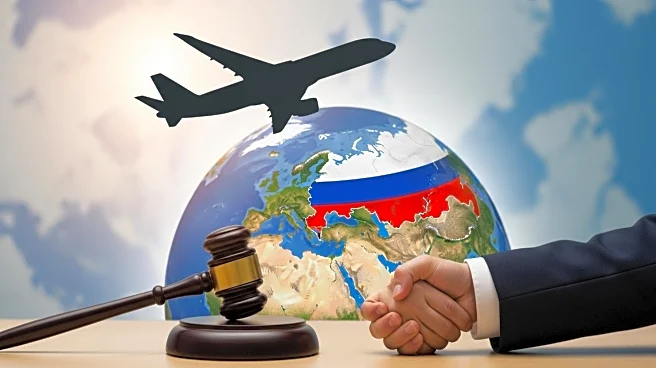What's Happening?
Major Chinese airlines have expressed strong opposition to a proposal by the Trump administration to prohibit them from flying over Russia on routes to and from the United States. The U.S. Transportation
Department suggested this ban last week, arguing that the shorter flight times for Chinese airlines put American carriers at a competitive disadvantage. In response, six Chinese airlines, including China Eastern, have submitted letters to the USDOT, highlighting the potential negative impacts of the ban. They argue that the restriction could extend flight times by two to three hours, increase fuel consumption, and heighten the risk of missed connections. Additionally, Air China and China Southern have warned that the decision could disrupt travel plans for thousands of passengers during the peak holiday season.
Why It's Important?
The proposed ban could have significant implications for international travel and trade between the United States and China. By potentially increasing flight times and costs, the ban may affect the competitiveness of Chinese airlines and disrupt travel plans for passengers. This move also reflects ongoing geopolitical tensions, as Russia has already barred U.S. airlines from its airspace in retaliation for previous U.S. actions. The situation underscores the complex dynamics of international aviation and the broader impact of political decisions on global commerce. U.S. airlines, represented by Airlines for America, have supported the effort but emphasize the need for balanced passenger capacity between U.S. and Chinese carriers.
What's Next?
The Trump administration's proposal is likely to face further scrutiny and debate, both domestically and internationally. Stakeholders, including airlines and trade groups, may continue to lobby for or against the ban, seeking to influence the final decision. The USDOT will need to consider the feedback from Chinese airlines and other affected parties before making a final ruling. Additionally, the broader geopolitical context, including U.S.-Russia relations and U.S.-China trade dynamics, may play a role in shaping the outcome of this proposal.
Beyond the Headlines
The proposed ban highlights the intersection of aviation policy and international relations, illustrating how geopolitical tensions can directly impact commercial operations. The situation raises questions about the fairness and strategic implications of such bans, as well as the potential for retaliatory measures from affected countries. It also underscores the importance of maintaining open and cooperative international air travel routes, which are vital for global connectivity and economic exchange.









